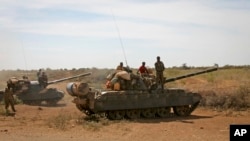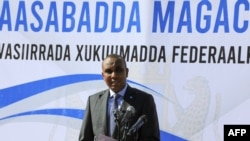Somalia Prime Minister Hamza Abdi Barre said Thursday that Ethiopian forces would not be part of the upcoming African Union Support Mission in Somalia (AUSSOM) unless Ethiopia withdraws from a controversial memorandum of understanding (MoU) signed with Somaliland earlier this year.
"If Ethiopia does not withdraw from its MoU agreement with Somaliland, its forces will not be part of the upcoming operation. If they remain, it will not be under the African Union mandate," Barre said Thursday during a town hall meeting in Mogadishu.
Answering questions from a town hall audience in Mogadishu, Barre said that the Somali government has effectively outmaneuvered Ethiopia concerning its intentions to implement the agreement with Somaliland.
"Ethiopia is now in a precarious position regarding the MoU agreement. When we rejected it, they turned to Kenya, Qatar, Saudi Arabia, and eventually to our Turkish brothers. We accepted these agreements on the condition that if someone attempts to impose something on us, we will resist,” he said.
“You are all aware that Somalis across the country, from Berbera to Hargeisa, Burao, and Borama, rejected the agreement. This (MoU) is not something Somalis anywhere can accept," the prime minister emphasized.
The MoU which triggered the ongoing dispute between the two neighboring countries grants Ethiopia access to 20 kilometers of the Red Sea coastline in exchange for the potential recognition of Somaliland's independence, which Somalia views as a violation of its sovereignty and territorial integrity.
Due to its tensions with Ethiopia, Somalia postponed the next phase of the African Union Transition Mission in Somalia (ATMIS) troop withdrawal originally planned for July to September, citing security concerns stemming from Ethiopia's actions as the main reason for the delay.
Last week, the United Nations Security Council passed Resolution 2748, which allows ATMIS troops to stay in Somalia through December 2024.
Somalia says all Ethiopian troops should be out of the country by the end of 2024, especially after the expiration of ATMIS.
In response to Somali accusations, Ethiopia's foreign ministry asserted its right to self-defense.
“There is no power that can stop Ethiopia from taking necessary action without asking permission from anyone,” stated Nebiyu Tedla, Ethiopia’s foreign ministry spokesperson, during a news briefing last week.
“Ethiopia has been contributing troops to Somalia for over a decade. Ethiopia has security concerns arising from al-Shabab; therefore, Ethiopia is following the issue closely,” Nebiyu added.
Despite ongoing efforts to resolve the conflict, including two rounds of negotiations facilitated by Turkey this summer, no resolution has been achieved. The core issue remains Ethiopia's refusal to annul the MoU with Somaliland, with a third round of talks scheduled for September in Turkey.
The international community, including the United Nations, the African Union, and the Arab League, has expressed support for Somalia's sovereignty and called for a peaceful resolution to the dispute. In the meantime, Somalia is coordinating with allies, including Egypt and Djibouti, to ensure that the new peacekeeping mission, AUSSOM, effectively addresses the nation's security needs without Ethiopian involvement.
At a news conference in Mogadishu on Thursday, Somalia’s minister of foreign affairs and international cooperation, Ahmed Moallim Fiqi, accused Ethiopia of derailing Turkish mediation efforts to solve the dispute.
“Ethiopian leaders’ recent remarks could exacerbate the existing situation and hinder progress towards Turkish diplomatic efforts to resolve the issue at stake,” Fiqi said. "I want to clarify that Somalia is only open to beneficial agreements with Ethiopia. We will not tolerate any military incursions or attempts to establish control over our waters or land, whether temporary or permanent," he warned.
Ethiopian military presence
Ethiopia and Somalia have a long history of territorial and political disputes, which stem from the Ethiopian Empire's expansions into the Somali-inhabited Ogaden region during the late 19th century.
The Ogaden War, also known as the Ethio-Somali War, was a military conflict fought between Somalia and Ethiopia from July 1977 to March 1978.
Somalia collapsed into anarchy following the overthrow of the military regime of President Siad Barre in 1991, creating fiefdoms controlled by clan militias and Islamic fundamentalist groups.
Ethiopia’s first military border crossing into Somalia began in 1997, to support Somali militia allies in the country’s Gedo region to drive out Islamic fundamentalist group Al-Ittihad Al-Islamiya.
They again invaded Somalia in 2006 during the rise of Union of Islamic Courts, which ruled large swathes of south and central Somalia for six months.
Several thousand Ethiopian National Defense Force (ENDF) troops, with tanks and heavy military hardware, went into Baidoa city located in the Bay region, southwest of Somalia, citing national security concerns aimed at preventing the creation of a hard-line Islamist state on its borders after Islamist insurgents had won control of most of the country.
The troops then spread across the country and engaged in a deadly battle with Islamists and nationalist groups in the country’s capital, Mogadishu, before leaving the country on Jan. 2, 2009.
Speaking in Addis Ababa at the time, then Ethiopian Prime Minister Meles Zenawi said that there would be no turning back.
"There is no need to rush, and I suspect our troops would want to pull out without rushing," said Zenawi. "That said, the withdrawal process has begun and there is no turning back."
The Ethiopian troops re-entered Somalia in January 2012 and became part of the AU mission, ATMIS.
Under the mission, at least 3,000 Ethiopian soldiers officially operate as part of an African Union peacekeeping mission fighting al-Shabab, but another 5,000 to 7,000 Ethiopian soldiers are stationed in several regions under a bilateral agreement.





